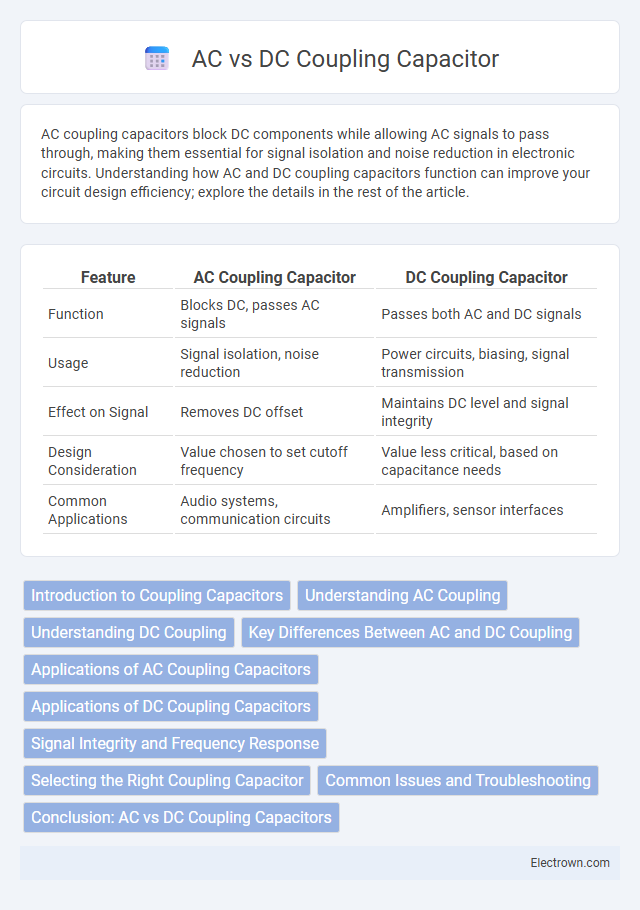AC coupling capacitors block DC components while allowing AC signals to pass through, making them essential for signal isolation and noise reduction in electronic circuits. Understanding how AC and DC coupling capacitors function can improve your circuit design efficiency; explore the details in the rest of the article.
Table of Comparison
| Feature | AC Coupling Capacitor | DC Coupling Capacitor |
|---|---|---|
| Function | Blocks DC, passes AC signals | Passes both AC and DC signals |
| Usage | Signal isolation, noise reduction | Power circuits, biasing, signal transmission |
| Effect on Signal | Removes DC offset | Maintains DC level and signal integrity |
| Design Consideration | Value chosen to set cutoff frequency | Value less critical, based on capacitance needs |
| Common Applications | Audio systems, communication circuits | Amplifiers, sensor interfaces |
Introduction to Coupling Capacitors
Coupling capacitors enable AC signal transmission between circuit stages while blocking DC components, preserving proper biasing conditions. These capacitors vary in functionality: AC coupling capacitors effectively pass alternating current signals, whereas DC coupling capacitors allow both AC and DC signals to pass, maintaining signal integrity in different electronic applications. Proper selection and placement of coupling capacitors optimize signal quality, reduce noise, and enhance overall circuit performance.
Understanding AC Coupling
AC coupling uses a capacitor to block DC components, allowing only AC signals to pass through, which is essential for isolating signal sources and preventing DC bias from affecting circuits. This technique is widely applied in audio and communication systems to preserve signal integrity without altering the baseline voltage. Your circuits benefit from AC coupling by maintaining signal clarity while protecting sensitive components from steady-state voltage levels.
Understanding DC Coupling
DC coupling allows signals to pass directly through a circuit without blocking the low-frequency components or DC level, ensuring the integrity of the original signal is maintained. It is essential in applications where preserving the DC bias or offset is critical, such as in amplifiers and sensor interfaces. Your design choices should consider DC coupling when accurate representation of the entire signal waveform, including its DC component, is required.
Key Differences Between AC and DC Coupling
AC coupling capacitors block DC components while allowing AC signals to pass, making them essential in signal processing where DC offset removal is required. DC coupling capacitors enable direct connection of circuits, preserving both AC and DC signals without attenuation, which is vital for accurately transmitting low-frequency or steady-state signals. Key differences include signal integrity, frequency response, and application suitability, with AC coupling used for isolating stages and DC coupling preferred for full-spectrum signal transmission.
Applications of AC Coupling Capacitors
AC coupling capacitors are essential in signal processing, blocking DC components while allowing AC signals to pass through, making them ideal for audio equipment, communication systems, and sensor interfaces. They maintain signal integrity by preventing DC bias from affecting amplifiers and other stages in circuits, especially in amplifiers, oscilloscopes, and data converters. Your electronic designs benefit from AC coupling capacitors by isolating different sections of a circuit without disrupting the AC signal flow.
Applications of DC Coupling Capacitors
DC coupling capacitors are primarily used in applications requiring direct current signals to pass without attenuation, such as in amplifier circuits, sensor signal transmission, and analog-to-digital converter inputs. These capacitors enable accurate signal amplification and integrity by allowing DC biasing alongside AC signal components. Their use is critical in systems demanding precise measurement and control, including instrumentation and communication devices.
Signal Integrity and Frequency Response
AC coupling capacitors block DC components while allowing AC signals to pass, preserving signal integrity in high-frequency communication by preventing baseline shifts. DC coupling enables direct current flow, maintaining signal fidelity for low-frequency or DC signals but potentially introducing offset errors. Your choice between AC and DC coupling capacitors directly impacts frequency response and noise immunity in electronic circuits.
Selecting the Right Coupling Capacitor
Selecting the right coupling capacitor hinges on factors such as capacitance value, voltage rating, and frequency response to ensure signal integrity between AC and DC circuits. The capacitor must block DC components while allowing AC signals to pass without distortion, often requiring a careful balance between size and performance characteristics. Your choice directly impacts signal clarity and circuit stability, making it essential to match the coupling capacitor to the specific application and operating conditions.
Common Issues and Troubleshooting
Common issues with AC coupling capacitors include signal distortion and baseline drift caused by inappropriate capacitance values or leakage currents. DC coupling capacitors often face problems such as polarization voltage limits being exceeded, leading to capacitor breakdown or reduced lifespan. Troubleshooting involves verifying capacitor specifications against circuit requirements, checking for physical damage or leakage, and ensuring proper polarity for electrolytic capacitors.
Conclusion: AC vs DC Coupling Capacitors
AC coupling capacitors block DC voltage while allowing AC signals to pass, making them essential for signal isolation and preventing DC offset in amplifiers. DC coupling capacitors, or direct connections, permit both AC and DC components, preserving the entire signal waveform without distortion. Your choice depends on whether you need to isolate DC components or maintain the full signal spectrum for accurate signal transmission.
AC vs DC coupling capacitor Infographic

 electrown.com
electrown.com